In pictures: Green Schools projects evaluation — West Nile region
Five schools in West Nile region have been evaluated for their projects on addressing climate change under the Green Schools Initiative.
A student of Muni Girls' Secondary School in Arua city harvests tomatoes from the school garden on July 17, 2024. Muni is one the schools under the Green Schools Initiative. (Credit: Simon Peter Tumwine)
_____________________
GREEN SCHOOLS INITIATIVE PROJECTS EVALUATION
📍 WEST NILE REGION
Two teams of evaluators are visiting schools in different regions of Uganda to assess their climate change projects as one of the activities of the Green Schools Initiative, which is in its second year of implementation by Vision Group in partnership with the Food and Agriculture Organization of the United Nations (FAO) and funding from the Embassy of Sweden in Uganda.
It is a two-track initiative: One is debate on climate change matters and the other is innovative projects aimed at mitigating or adapting to climate change. For the debate competition, 30 schools from 10 regions — three per region — qualified for the national championship that will take place this August. The schools behind the best innovative projects will also be rewarded alongside the top debating schools.
The top projects will be selected from the evaluation exercise going on now. Five schools per region made the cut for evaluation, which makes it a total of 50 schools.
Take a look at a our selection of pictures from the West Nile region evaluation visits in two days:
____________________
OLEBA SEED SECONDARY SCHOOL
First stop was Oleba Seed Secondary School in Maracha district on July 16.
The school is a government-aided institution.

The evaluation team was guided on the school visit by the school's Green Schools Initiative coordinator Jesca Okundwo (2ndR) and Rose Agnes Drasiku (R), the senior woman teacher.

The school has an incinerator for burning waste materials.

For this Green Schools Initiative, the teams evaluating the school projects have a series of questions they put to the school authorities as regards practices related to mitigating or adapting to climate change.

Oleba Seed Secondary School turns to the skies for energy solutions, as evidenced by these solar panels.

With an improved kitchen, the school now spends less on fuel than before.

Students are keen on keeping the school environment clean.

Norbert Draleku, a member of the school's Environment Club, says he is happy that students are not allowed to come into the school with polythene bags.

Inside the school library, students immerse themselves in reading material, including newspapers, to gain more knowledge and information about climate change.

ARUA PUBLIC SECONDARY SCHOOL
Next, the evaluation team visited Arua Public Secondary School in Arua city.

There is evidence of green and cleanliness around the school.

A water source, including this borehole, and waste bins are present.


The school has an improved kitchen for energy efficiency, which in turn cuts down on the emissions into the atmosphere.


Annet Namuli, who is part of the evaluation team, is seen taking down notes.

Faith Kwikiriza, also on the evaluation team, busy jotting down notes during the assessment tour around Arua Public Secondary School.

The school has running water.

The school uses both grid and solar power. The latter powers the administration office.
Arua Public also engages in tree planting and greening of its space.

BISHOP ANGELO TARANTINO MEMORIAL SECONDARY SCHOOL
Another West Nile school that was on the evaluation programme was Bishop Angelo Tarantino Memorial Secondary School, Ediofe in Arua.

Here, some of the students were seen taking advantage of the tree shade to do their revision.

Lawrence Mwadeyo (R), the school's Green Schools Initiative coordinator, guided the evaluation team around the school.

Efforts aimed at having more trees at the school.

The school puts to good use discarded plastic bottles to protect the young trees.

The school engages in small scale gardening, where they grow vegetables such as cabbages. Long term, the school want to expand its urban farming scheme.
Sitting on uneven ground, the school plans to level the school compound, demarcate it and then plant grass to fill out the bare spaces.

With energy-saving stoves in the improved kitchen, Bishop Tarantino is now using very little fuel as a result.
The school has an incinerator on the girls' section.
The school has banned single-use polythene bags and have replaced that with paper bags, made by the students themselves.
MVARA SECONDARY SCHOOL
The next school in West Nile that the evaluation team visited was Mvara Secondary School in Arua, which hosted the regional debate qualifiers in June.

The expansive school has green everywhere, including fruit trees (oranges, guava, etc) on the school compound.

On top of other sources of water, the school also harvests rain water.

Mvara has an improved kitchen, with energy-saving stoves that reduce on the amount of fuel used to cook food.


The evaluation team assessed the school on many factors, including waste disaposal.

MUNI GIRLS' SECONDARY SCHOOL
The fifth and final school in West Nile for evaluation was Muni Girls' Secondary School in Arua city.


Signs of greening, in the context of waste disposal...

...as well as in power solutions.

The school has planted many trees on its compound.



Theirs is also a talking compound, reminding the student and visiting community on a clean and healthy environment.

The school uses energy-saving stoves.

An incinerator is present.

The students are engaged in gardening.

They tend the garden that feeds them.


The school sells the excess produce from their garden, including tomatoes an cabbages, to the community members.



Nurturing the young flora.

Headteacher Dillys Ayigaru (pictured below) is into small-scale commercial farming.
She has a garden of mainly tomatoes next to the school's garden and has already sold off the previous season's harvest.
Ayigaru says she loves to farm alongside her office work.

